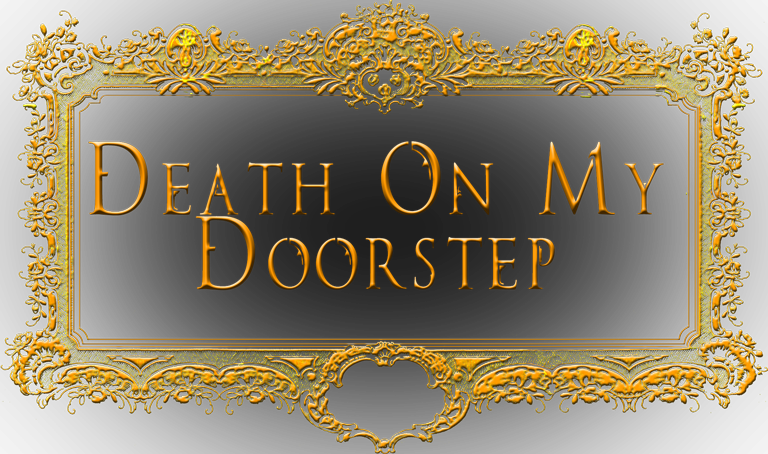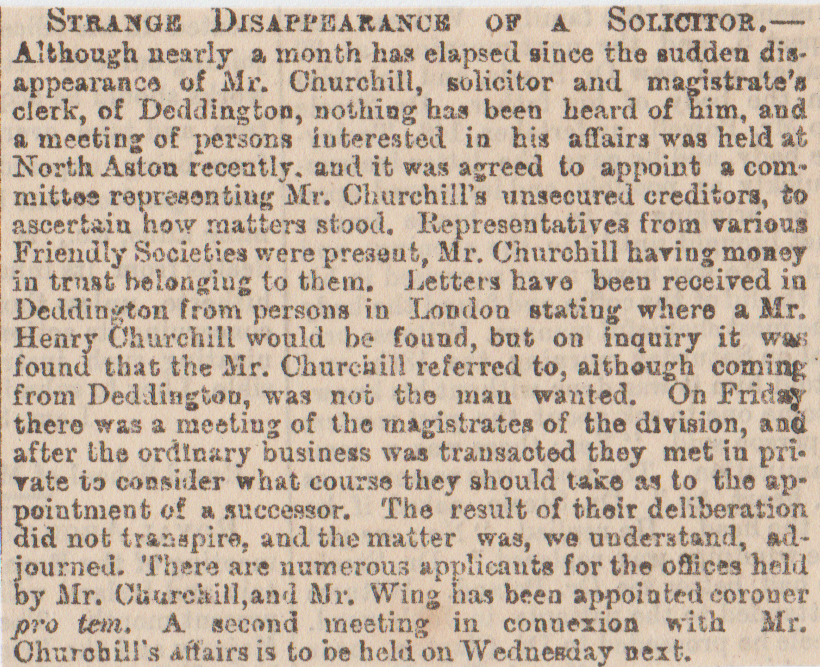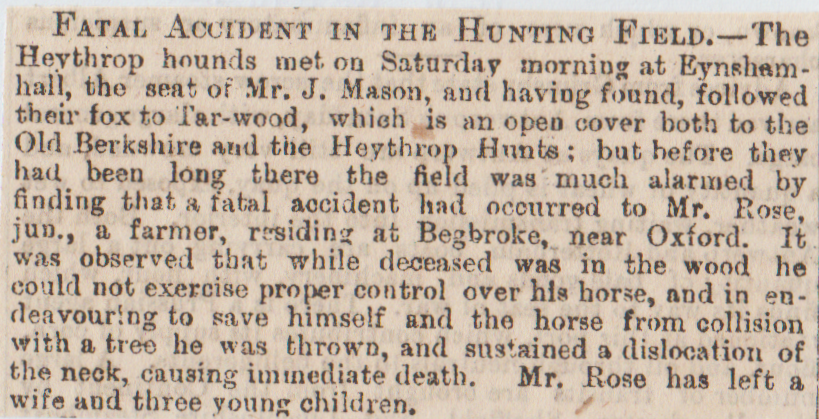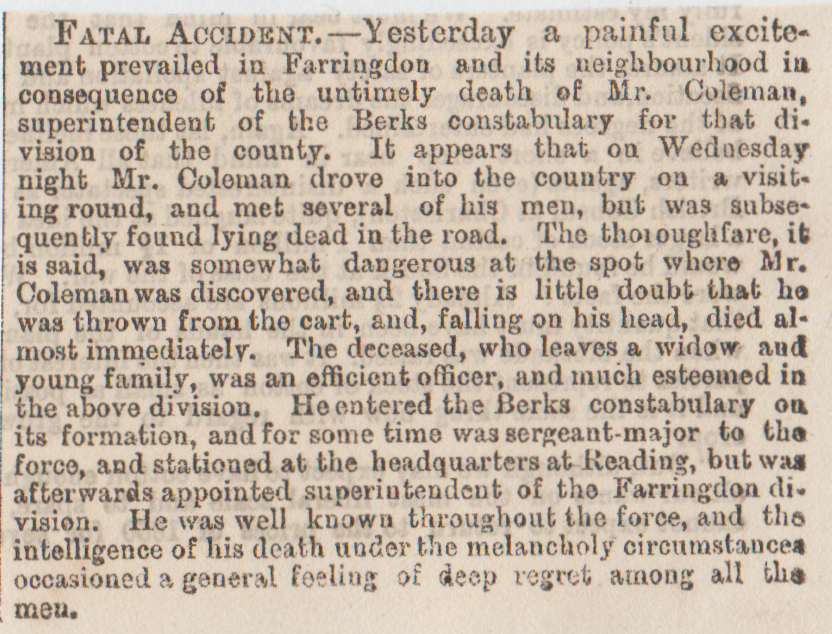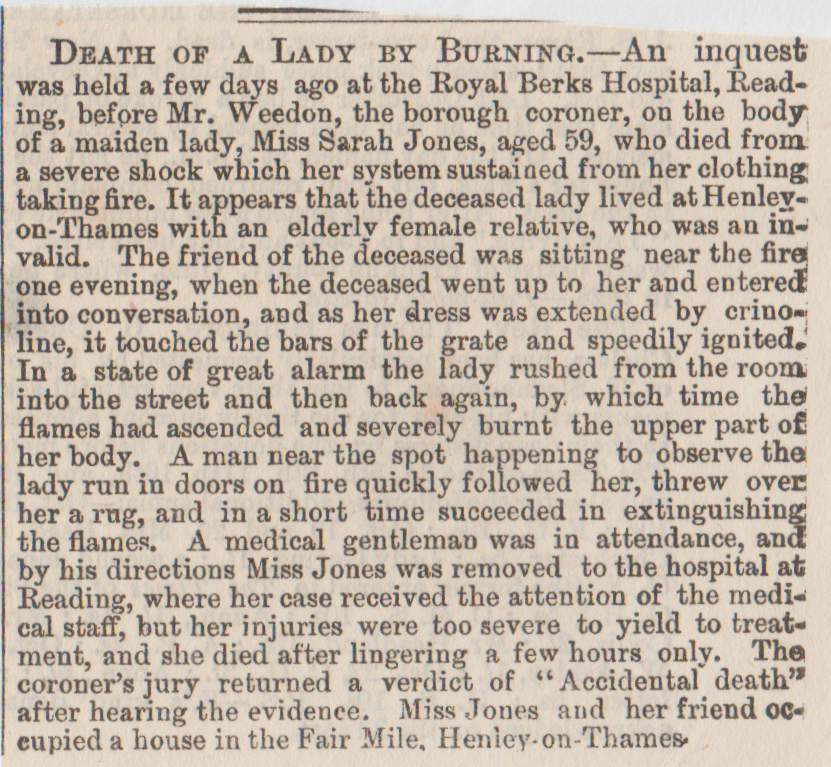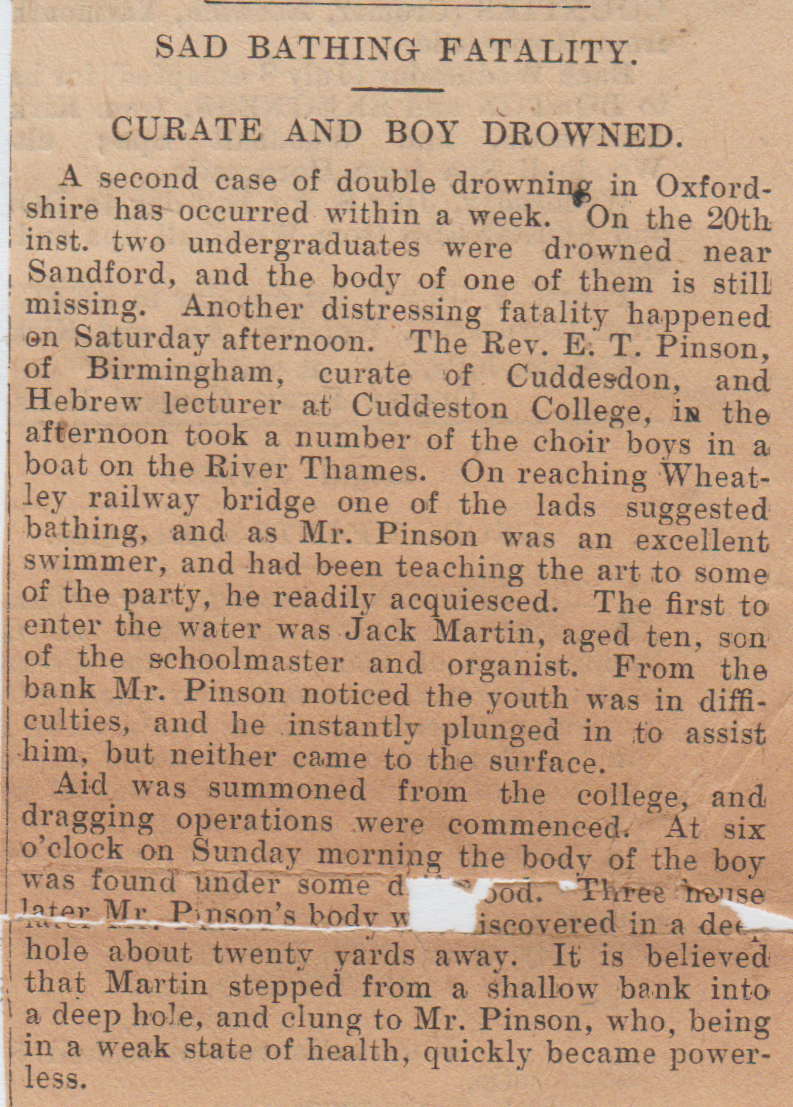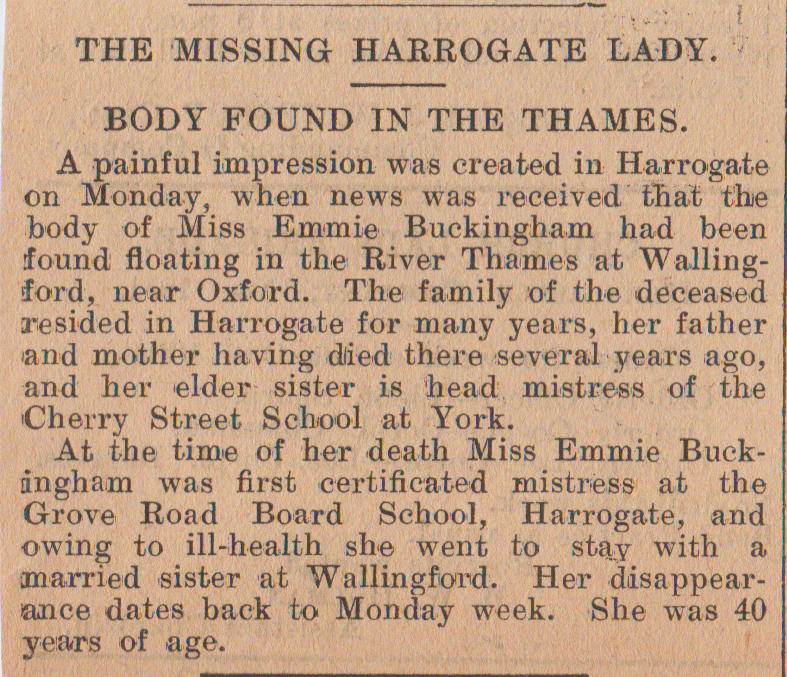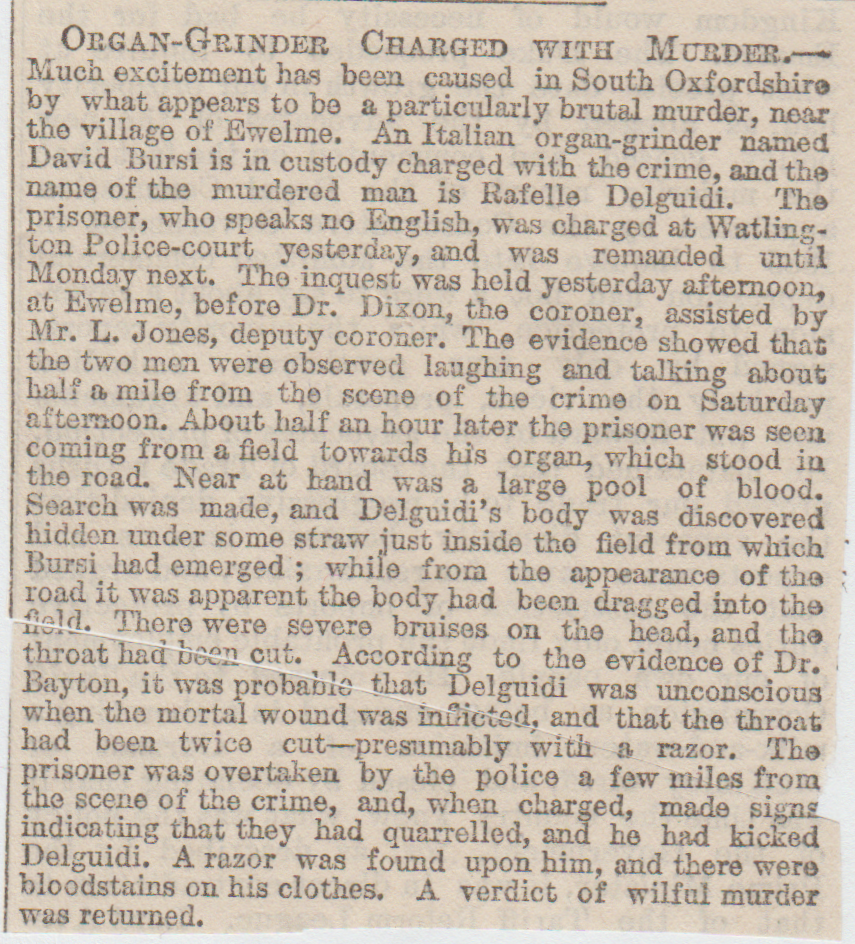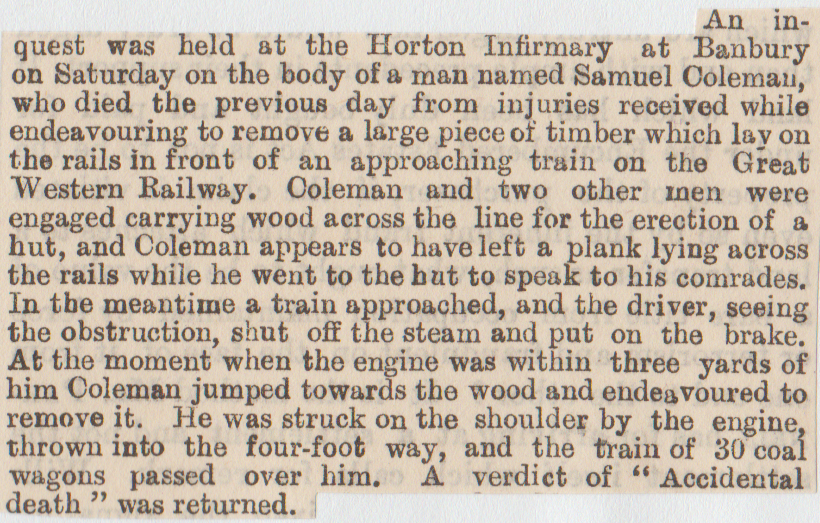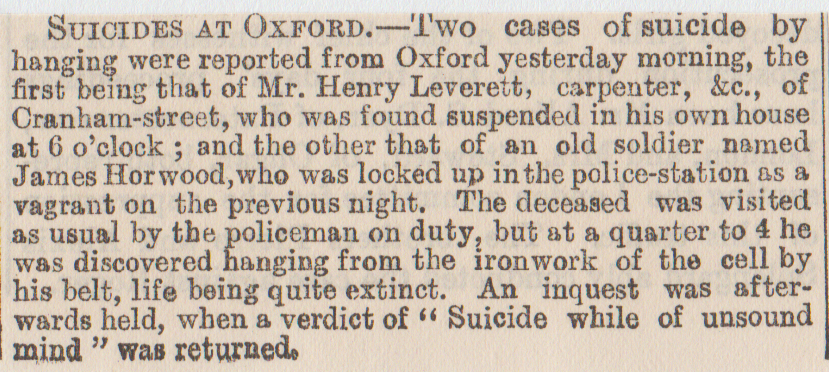1/ Henley Bridge Suicide, July 1909
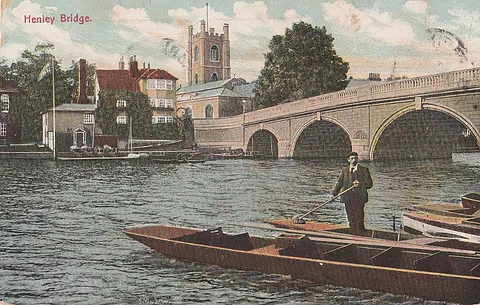
An unidentified man, dived fully clothed into the Thames, swam a few yards, then kind of gave up the ghost and let himself go under. Police dragged the spot where he went under and brought up the body. One clue to his identity, however, was a set of three South African medals on his chest.
2/ Didcot Station Suicide, March 1861
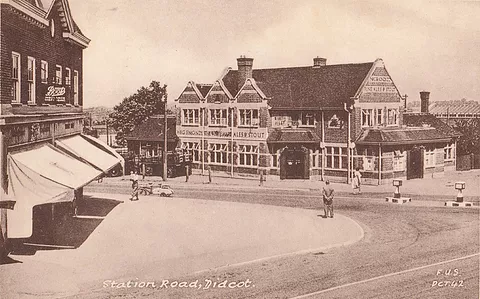
A train pulled in at Didcot Station at 9:55 in the morning and off steps a well-dressed chap with a “vacant look” on his face. He said one or two things to the guard, which he realized was not normal behaviour. The guard ushered him into a room at the station and left him for fifteen minutes or so to calm down. The guard returned, only to find him lying on his back with a huge gash in his neck, drenched in blood; there was a pen-knife by his side. They searched his pockets to find out his identification and as it turns out it, he was a Mr.Gale from Oxford. Apparently, friends of his said he’d been under a lot of strain recently and his behaviour had been erratic, but he was never suicidal in his tendencies. The verdict was “Deceased inflicted the fatal wound while labouring under insanity”.
3/ River Cherwell Suicide, Oxford, December 1869
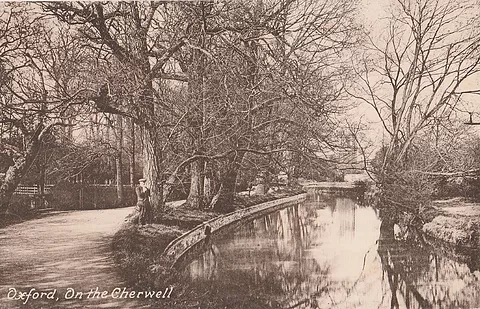
A fifteen-year-old lad named John Arthur Hone, whose father was a vicar in the parish of Bradleigh near Redditch, succumbed to pressures of a youngster studying at Oxford and went down to the Cherwell and dived in. Hone had a twin brother with him and went to school with him the day he committed suicide. He explained that he was sometimes depressed and found the school-work difficult. He left this note; “Darling Brother-I feel that life will only be a burden to me and my parents if I live any longer. It is all right. I hope to be soon in heaven. Don’t trouble about me; I will soon see all your happy faces again with all the angels in Heaven. I quickly commit myself to God, in hope that I shall be soon with him- I remain, your dear brother, JOHN.” – Coroner’s jury found that he was insane.
4/ Oxford Executions, March 1892 (See Hertfordshire for Puddephat)
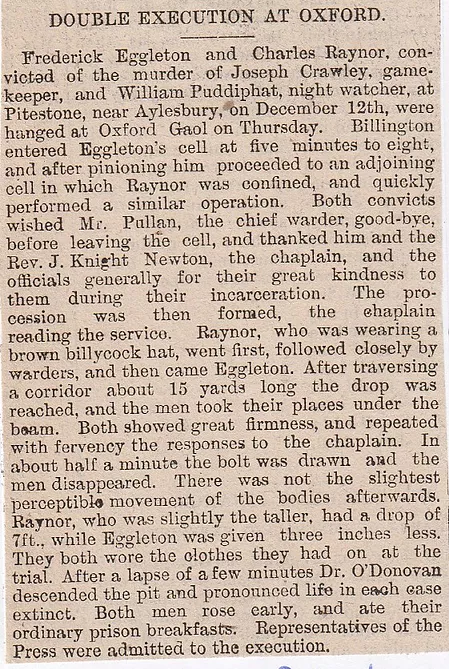
5/ Near Oxford, (Railway Suicide) July 1890
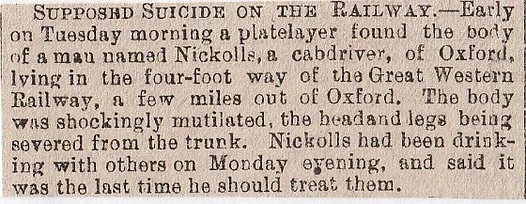
6/ Yarnton Murder?, February 1901
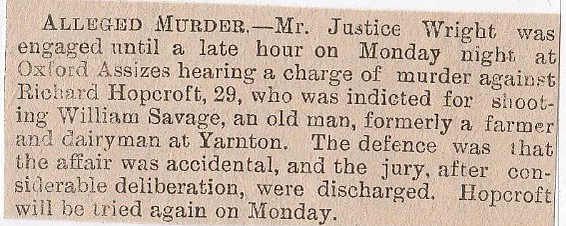
7/ Blenheim Park Murder, August 1885 (See clippings below)
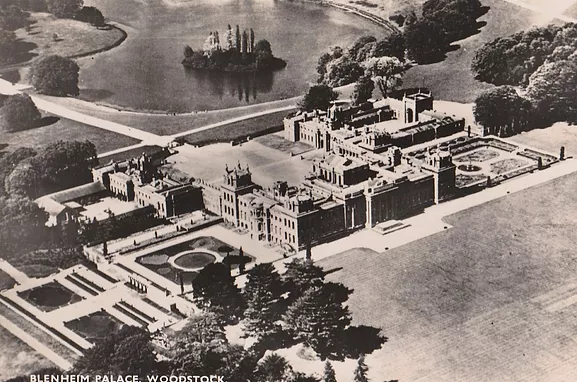
This was the murder of gamekeeper, William Beckley, in Blenheim Park, by George Boddington. He stated that Beckley was already dead when he found him under a tree in the park. Beckley had a history of illness and had been seeing his doctor for ailments such as diarrhoea, prostration, and heart disease. When a doctor was sent to Beckley, the man who saw the doctor said that he was dead, but didn’t mention the head wounds or cuts. A certificate was issued that death was of natural causes, then the body was taken to Water Meadow Lodge, the home of Beckley. Inspector Oakley went to see the daughter that evening and to examine the corpse and he assessed that the man had been savagely beaten with a blunt instrument, such as a spade. Oakley sealed the bedroom in which the corpse lay and got hold of the doctor who pronounced his death as natural. He said that he was just told that he was dead, and nothing else. Boddington was arrested for the crime and later confessed to murdering him while at Oxford Castle and also said he battered him with a pick-axe. The reason for his attacking him was that an argument had arisen. The murder weapon was found near to the murder scene.
8/ Blenheim Park Suicide, April 1859
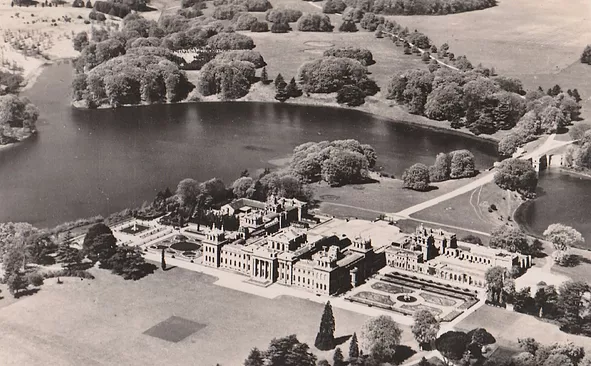
This is the story of the Spanish gentleman who committed suicide in the grounds of Blenheim Park. He left the name A.Arrom de Ayala on his suicide letters and he went to Blenheim to do some drawing of the parkland and house. He left the inn at midday and asked for dinner at six o’clock. A labourer by the name of Josiah Wickson was walking along the Combe Bottom, in the park, when he spotted an umbrella, then a person lying near the trees. Upon further examination he found the man bleeding from a bullet wound in the head. He had the pistol in his hand and he had put the gun in his mouth and fired. A letter to the Duke of Marlborough was found on him, it read:-
“My Lord-I humbly ask your Lordships pardon and forgiveness for the great liberty I have taken in coming to put an end to my dreary and miserable existence in your park. It may be a childish feeling, but one cannot blow his brains out on a common road, or a field full of cottages, and life, and civilization, and railways, and establishments of all kinds, of which your blessed country of England abound. So I have not found another proper place to die decently than your handsome park, and you must bear the inconvenience of a dead man in your grounds. I visited your house yesterday, hoping the sight of good things, chiefly paintings, could do me good, and soften the wild ideas that had led me to put an end to my life; but all of no use. Your manor is the most noble, splendid things I saw in my life. You have the finest Reubens that can be seen; that should have a great attraction for me under other circumstances, but now they have no use. I hope with that splendid house, and park, and paintings, and library, you are happy my Lord. If that is the case you have a kind heart, and pity the poor devil come to die on your grounds. If, on the contrary, you are miserable also, as wealth is a medium, and do not constitute happiness, then you will say like old Dido -“Non ignara mali,miseris succurere disco”-and pity me,and order that they shall leave me quiet, and bury me in the spot I have died, and put a cross on it in the Spanish fashion.I will be very grateful in the other world for it if you do so and wish not to trouble your Lordship any more about me. I am, my Lord, yours respectfully, A Arrom de Ayala”
The next one is a letter to the landlady of the inn he was staying at:
“My Dear Madam-Pray do not be alarmed when you know I am dead, on account of my payment of expenses at your comfortable place; I had rest and quiet for my last arrangements at your hotel, and comfortable accommodation, and I am grateful for it. I wrote to my friend I London, Mr Albert Rottman, 26 Duncan Terrace, Islington, who will come, open my carpet bag, and pay my last bill on earth. If the letter is lost, and he does not come, nor any of my friends or relatives to settle your bill, I authorize you to open my carpet bag and take £4 out of the £11 you will find in my purse, and send the bag, with my watch, chain, a ring with the coat of arms of Spain, and all its contents to Messrs.Doft,Gordon and Co., 79 Great Tower Street, to be sent to my wife in Spain. Pray forgive me the trouble I cause you. Yours obediently-A.Arrom de Ayala”
9/ Blenheim Park Murder, August 15th, 1885
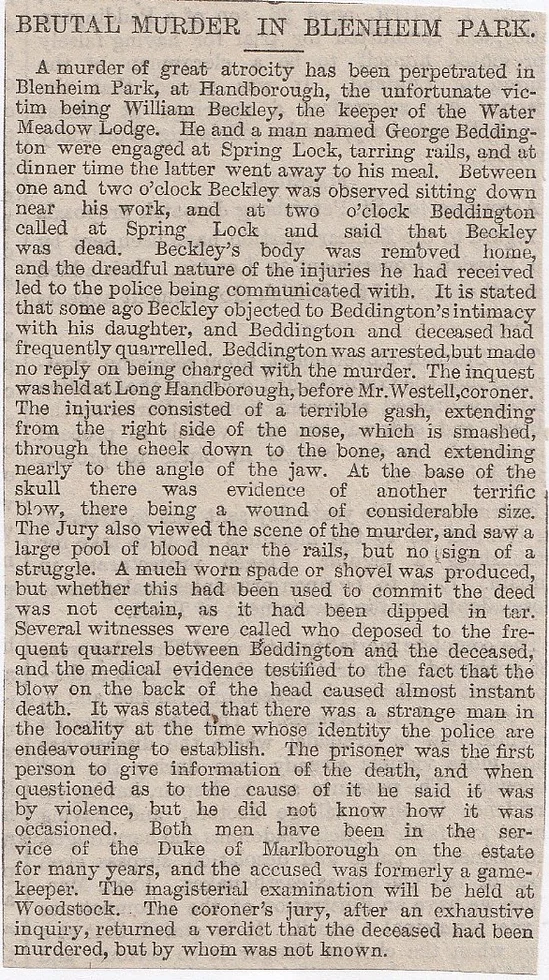
Blenheim Park Murder, August 19th, 1885
George Boddington, who is in custody on a charge of murdering William Beckley in Blenheim Park, has made a full confession of the crime. He admits that he quarrelled with Beckley and the terrible wounds on the face and head of the deceased were caused by him with blows by a pick-axe, which had been found near the scene of the crime. The prisoner will be brought before the magistrates at Woodstock.
10/ Blenheim Park Murder, August 20th, 1885
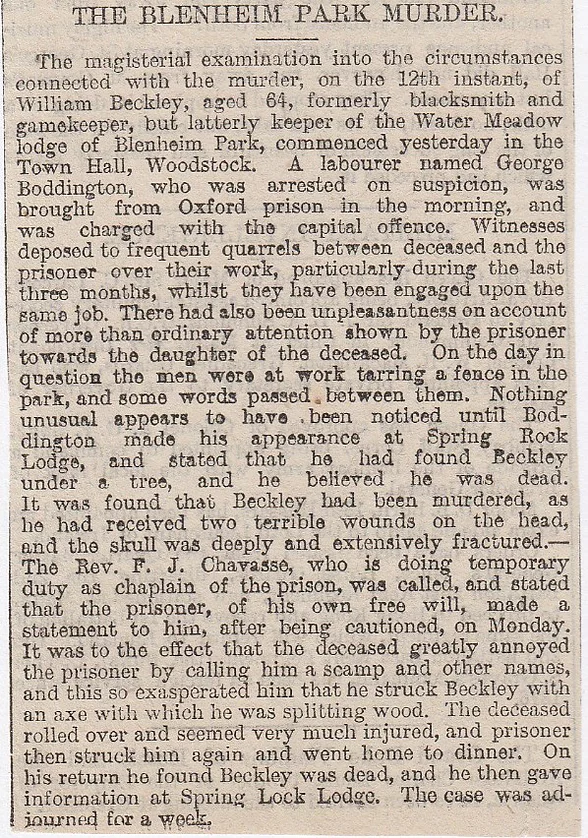
11/ Blenheim Park Murder, August 28th, 1885
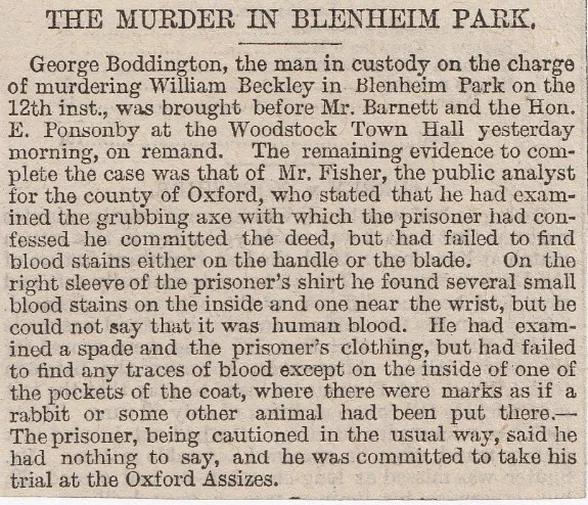
12/ Blenheim Park Murder, October 28th, 1885
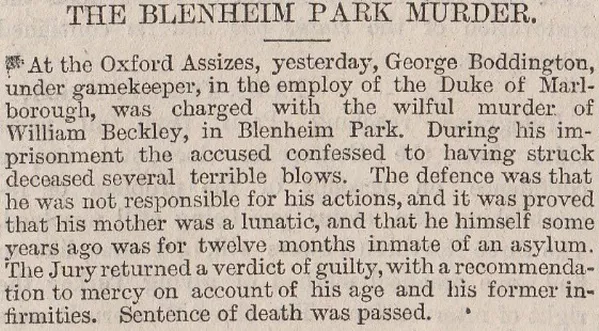
13/ Oxford, April 1878 (Father and Daughter Suicide)
Mrs Weaving, the wife of a surgeon, drowned herself in a tank in the house. The tank itself was only ten inches wide. Evidence was put forward that deceased had fallen into the river three years ago and she’d shown symptoms of mental derangement and also tried to get poison and other chemicals from the surgery. On the day she killed herself, her father had poisoned himself in Birmingham, but this fact was unknown to her at the time. The verdict found that she had not been in her right mind and suffocated in the tank.
14/ Wantage, June 1830 (Boy in Well)
At Lockinge Kiln Farm near Wantage, W.Giles, a seven-year-old boy, fell into a well that was 125 yards deep. The boy was throwing stones in the well when he fell down, and to make matters worse the father had a fit while on his way home and he fell off his horse. Also, the chap who fished the boy from the well by bucket nearly died from the inhalation of the noxious gases at the bottom of the well. He was struck dumb for three days.
15/ Woodstock, October 1832 (Child Hangs by Accident)
Harriet Hitchman, a year and half old child, was climbing on some railings outside her home, and when she tried to get down the railing caught the front of her bonnet and the material beneath her chin formed a sort of noose and she hung herself accidentally. A sister went to get her mother but the child was dead when they arrived back.
16/ Abingdon High Street, March 1830 (Accidental Hanging)
A dreadful accident occurred at the High Street in Abingdon. The only son of Mr Richardson, who wasn’t quite two years old, was put to bed to have a nap and it somehow got its head into the loop of the curtain, which was on the pillow, and strangled himself. He was hanging a couple of inches from the ground and was found by the child’s nurse.
17/ Oriel College Fatal Accident, March 1849
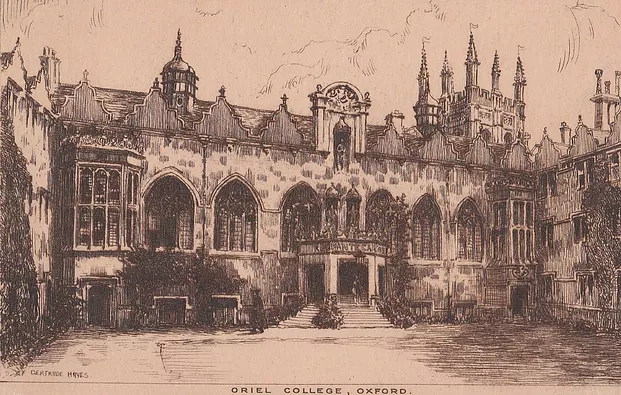
Oriel College was abuzz with a morbid excitement when the body of nineteen-year-old John Key, a commoner from that college, was found in the quadrangle near the chapel door and close to the hall staircase, within a few feet of the wall. His injuries bear the hallmarks of him falling from a window or off the roof, about a forty foot drop. The deceased had a blood-soaked face, with the gravel stuck to it, a dislocated shoulder and a broken right wrist. Evidence suggests that he had been drinking and was put in his room, but he got mad, so his friends had blocked the door with a sofa. Chances are he probably climbed out of the window and tried to get to the room of another student, but slipped and fell to the pavement below. The verdict: “John Key having fallen over the parapet, was killed by the fall”
18/ Kingham, August 1885 (106 year old in 1885!)
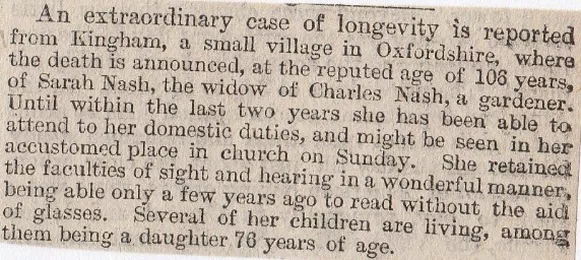
19/ Banbury Suicide, January 1894
William Sulston, living near Thame in Oxfordshire, died at Banbury in a strange manner. He had brought a horse for sale at the Fair and he was tricked by some dealers and ended up out of pocket. The solution nowadays would be to get it back or report them to certain authorities, but he thought suicide was the best option. He chose an original way to do it. He bought a bottle of gin, went to his room at the inn, and downed it in one. He was discovered later on and was dead the following morning.
20/ Kidlington Double Murder/Suicide, July 1908
This awful tragedy occurred in the village of Kidlington, about six miles from Oxford. (Not now it’s not). Mr Joseph Cleworth, a pensioner, went for a boat trip on the river with his two daughters, Eileen, six years old, and Josephine, aged just four. When the bodies were found in the river, the girls had been fastened to the father with a rope, which gives you the impression that he had intended to commit suicide and take the girls with him.
21/ Middleton Hall Suicide, February 1836
The Earl of Jersey’s family is in shock at the suicide of Susan Garrett, a favourite servant of the Countess. Garrett had been with them from being a child and had given great service over the years. Her body and that of a small child were found in a cistern at Middleton Hall in Oxfordshire. Verdict-“Drowned herself in a state of temporary derangement”. (Is Hall still there?)
22/ Osney Bridge Collapse, December 1885 (Did Miles survive?)
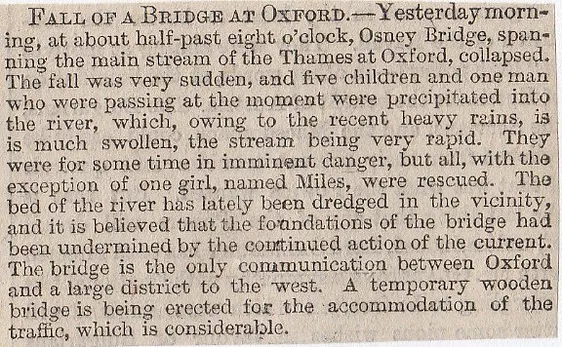
23/ River Cherwell, October 1915 (Body Found)
The body of an unknown man was found floating in the Cherwell near to Magdalen Bridge, Oxford. He was about forty years old and was wearing military type clothing and boots.
24/ Chipping Norton, January 1868 (Child Skeletons in House)
Rebecca Townsend passed away recently at Kingham near Chipping Norton, aged eighty-three years. She had lived a solitary life and never got married and been alone for at least fifty years. The village bobby and the rector had the job of taking an inventory of her belongings because she had no friends or living relatives. While going through the stuff, a box was found under the bed. They had to check everything, so they opened it and saw three little compartments and in each was the remains of an infant. The bones were approximately forty to fifty years old. The verdict was “Found dead, but how the infants came by their death there is no evidence to show. (Probably children who died in childbirth, but she decided to keep?)
25/ Sonning Murders near Henley, February 1908
A multiple murder was committed by a man named Holmes. Early one morning a smartly dressed man was banging on the door at Sonning Vicarage, about six miles from Henley. The vicar called from a window as to what he wanted and he replied he wanted to be let in. The vicar told him to go to the Bull Hotel and he went away mumbling to himself. When the vicar heard about the murders, he connected it with the early morning visitor. The previous vicar was Canon Holmes and the visitor was Mr Holmes, his brother, who still thought that he lived there. The story was as follows:-The gardener found the four dead women at Crossmore House at Fawley. Lizzie Hayes aged twenty-one, the cook and Ethel Morris aged seventeen, then found Mrs Holmes, his wife and Miss Holmes, his daughter, dead in a bedroom. They had all been shot at point-blank range while they slept. The gardener who found them was engaged to the cook, Lizzie Hayes. Mr Holmes committed suicide rather than face justice. Clearly mad!
26/ Abingdon Murder, August 13th, 1885
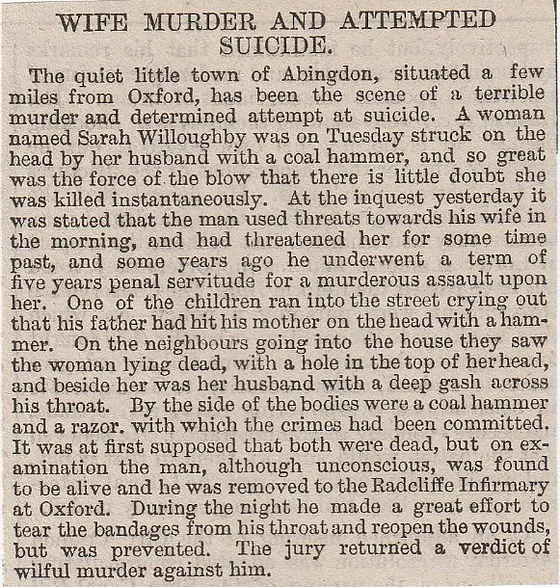
27/ Abingdon Murder, September 11th, 1885
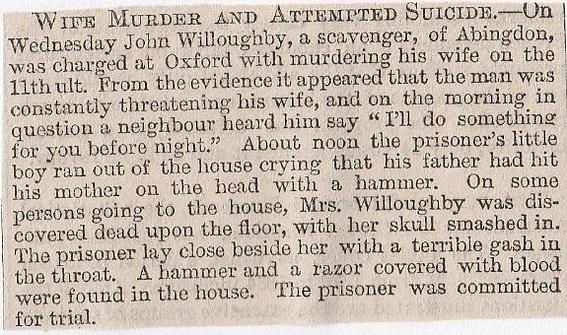
28/ Bagley Wood (Murder or Suicide?), near Oxford, October 1893
A gruesome discovery has got tongues wagging in the neighbourhood of Kennington, south of Oxford. A middle-aged woman’s body was found in Bagley Wood. A couple of blokes were gathering wood and the wheel of their cart drove over the body, which was covered over with leaves and bracken. Post-mortem suggests that the body had been there two to three months and the tags on the underclothes bore the name “S.Hall”. A couple of yards from the head was a bonnet, with a handkerchief in it. A few more yards away was a woman’s boot. It looks like murder but it is deemed to be a suicide. The identity of the woman is currently unknown.
29/ Tackley Murder, October 1904
Frank Ernest Allwood, a twenty-nine-year-old carpenter from Birmingham, left home about a month ago in order to seek work elsewhere. He took with him, his £7 he had saved as a back-up. His body was discovered in a barn, covered over with straw. Two tramps were seen in the area watching him and police are yet to find them. “Wilful murder by some person or persons unknown.”
30/ Oriel Street Suicide, Oxford, September 1868
Mr Reynolds, a university grocer of Oriel Street, threw himself from the top floor window onto the pavement below. He was an elderly gentleman but his health had been in decline for quite a while and had recently started to have epileptic seizures. The day before his death he had expressed his wish to kill himself, so with these words friends and family were looking for a place in the lunatic asylum. He was cared for by a nurse at home, but while they were busy he managed to get to the top floor and realize his wish.
31/ River Leach Murders, July 1893
Two children from Little Farringdon in Oxfordshire went missing. The next day, the body of the youngest child, only five years of age, was discovered in the River Leach, and the day after that, the elder child only seven years old was found near the river-side with its throat cut and body mutilated. Police arrested a man, James Lapworth, for the monstrous crime, as he’d been seen hanging around the area.
32/ Harwell Policeman Murder, Oxfordshire April 6th, 1899
Constable Charlton of Harwell in Berkshire, was on Monday set upon by two men and severely kicked. He died on Tuesday night. A hawker has been arrested.
33/ Harwell Policeman Murder, April 7th, 1899
An inquest was held on the body of the policeman Charlton, who died from injuries received in a struggle with two hawkers named Joseph Slatter and Robert James, whom he and another constable had ejected from a public-house. The men attacked them in the road and Charlton was thrown, kicked and fatally injured, with the skull being fractured. A score of bystanders watched the struggle without rendering assistance and Charlton’s comrade was left to cope with his assailants, whom he felled with his staff. A verdict of “Wilful murder” was returned against Slatter and James, who are in custody. (When people stand and watch a brutal attack or murder, it is known as “Genovese Syndrome”. Named after Kitty Genovese, who was murdered in New York and with nobody helping her. Clint Eastwood got the idea for “High Plains Drifter” from reading about the Genovese case.)
34/ Harwell Policeman Murder, April 13th, 1899

35/ Harwell Policeman Murder, June 17th, 1899
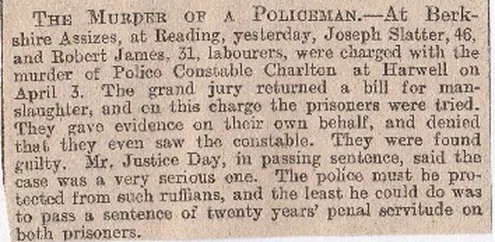
36/ Faringdon, April 1899
A young man named Pepler, while handling a toy pistol near Faringdon in Berkshire (now Oxfordshire) on Sunday, shot a younger brother, who died on Monday night.
37/ Goring Suicide, July 1887 (Who was she?/Where is she buried?) – Really sad this one!
The body of a young woman was found in the river at Goring in Oxfordshire. Details that followed the inquest were extremely painful and it seems she was a tall, good-looking lass and arrived in Goring with a gentleman and they rented an apartment at Stanley Villa, living as husband and wife. They both left after a few weeks, but she came back a couple of days later. Mr C. Jewell said that he had met her in Soho where she lived in scruffy digs, but he became interested in her life story. She had been an actress but she had an accident and that stopped her following her profession. She had also been a mistress to an officer who was killed in action in Egypt. Jewell said that seemed unhinged. In a letter from Goring to him, she wrote that she couldn’t stay there and was tired of life. She went back to her apartments in Osnaburgh Street, Regent’s Park, then he heard that she’d gone back to the country and would be back the next day. He thought that was Goring. While they lived in Goring she seemed dependent on him, passing off as man and wife. Notes in a pocket diary were found on her body and they read as follows: “Sunday afternoon. Still here. Cannot bring myself to die in the river. I am not mad. I go, therefore, being quite sane. I am backward to destroy my life. Wood and river full of boats and people. Must remain close. Am so untidy and so ashamed to be seen. July 1st, 9,10. Sunday morning.”
“In the Lockheart Woods, two nights wet through and found no food since I left town last Thursday. For one so carefully hard to bear. The fearful pain in my heart. The dark and lonely woods add to my wretchedness. Yet, alas; I would sooner be this miserable than return to town, where deep and unknown sorrow will be my fate. It’s hard to die young and I try to struggle against it. This unhappy death. I think if some kind friend was only here now, I would listen to advice. But too late. I must die- A.D.”
The letter found on the river bank read:- “Nothing much. Had I been able I should have done the deed last night, but meeting a young Oxford man who so kindly talked to me. How can I forget his sweet manner, and I am now glad I met him, for he unknowingly prolonged my stay on Earth. I only wish I had met him before. Perhaps this never would have befallen me-to die so young as I am- A.S. whoever finds this bag, let this be sent to my friends. P.S. July 8th, 1887- Have been in woods all day with nothing to eat. Am tired and weary tonight. It will soon be over, and after all, what have I to make me stay here?”
38/ Didcot Station Birth, January 1865

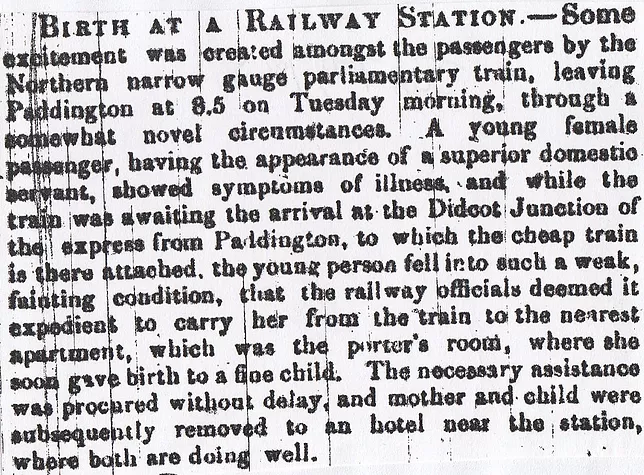
39/ Deddington- Solicitor Disappears. July 1870
40/ Eynsham Hall Hunting Fatality, December 1870 (Eynsham Hall is now a hotel and is at North Leigh)
41/ Fatal Accident to the Superintendent of Berkshire Constabulary, Faringdon. May 1866
42/ Death of a Lady by Burning, Henley-on-Thames. October 1866
43/ Two Drown on the Cherwell, Oxford. June 1903.
Mr C.F.Werren, Queen’s College, Oxford, and Mr C.E.Clemens, Magdalen College, two undergraduates, went out in a canoe on the Cherwell at Oxford on Saturday afternoon, and on Sunday the boat was found in Sandford Lasher. The bodies of the young men have nor been recovered, but there is little doubt that they lost their lives through the capsizing of their frail craft in the swollen stream.
44/ Vicar and a Lad Drowned, Wheatley Railway Bridge, July 1903.
45/ Body Found in the Thames, Wallingford. October 1903
46/ Murder by an Organ-grinder, Ewelme. February 1904.
47/ Confession to a Murder near Woodstock. February 1906 (Confessed in Lincoln Prison)
48/ Death in University Parks, Oxford. November 1906.
A painful incident occurred during a game of hockey in the University Parks of Oxford yesterday afternoon. While a practice match was in progress, Mr Claud S.Austin, an undergraduate of Pembroke College, suddenly fell to the ground. Two medical men who happened to be in the Parks made an examination and pronounced life to be extinct, death being due to heart disease. Mr Austin was in his second year of residence. His parents reside in Highbury, London.
49/ Man Run Over by a Train, Banbury? October 1880
50/ Bicester Gun Fatality. October 1880
At Bicester, on Saturday night, a labourer named Whitton, who is supposed to have been out poaching, was returning with a loaded gun in his pocket. Within a few minutes walk of his house the gun fell to the ground and went off, and the contents were lodged in his stomach. Medical assistance was obtained, but he died about 5 o’clock the next morning. The deceased, who was about twenty-two years old, leaves a widow and two children.
